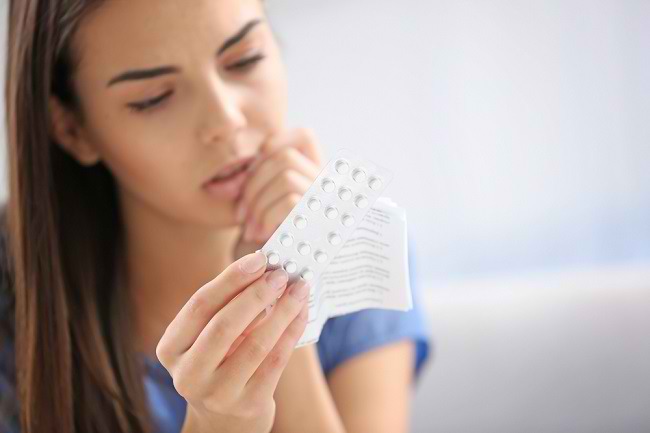Valacyclovir is an antiviral drug to treat diseases caused by herpes virus infections, such asshingles, herpes simplex, or chickenpox. This drug cannot prevent transmission of herpes virus infection. Valacyclovir should only be used according to a doctor's prescription.
Valacyclovir works by slowing the growth of the virus that causes infection. In the body, valacyclovir will be broken down into acyclovir. This drug can not eliminate the virus in the body but is able to reduce the symptoms caused, speed up healing, and prevent the infection from reoccurring.

Valacyclovir trademark: Herclov, Iclofar, Inclovir, Norus, Valciron, Valcor, Valtrex, Valvir
What is Valacyclovir
| group | Prescription drugs |
| Category | Anti Virus |
| Benefit | Treating herpes virus infection |
| Consumed by | Adults and children 12 years old |
| Valacyclovir for pregnant and lactating women | Category B: Animal studies have not shown any risk to the fetus, but there are no controlled studies in pregnant women. Valacyclovir can be absorbed into breast milk. If you are breastfeeding, do not use this medicine without consulting your doctor first. |
| Drug form | Caplets and tablets |
Precautions Before Taking Valacyclovir
Valacyclovir should only be used according to a doctor's prescription. Here are some things you need to pay attention to before taking valacyclovir:
- Do not take valacyclovir if you are allergic to this drug. Tell your doctor about any history of drug allergies you have.
- Tell your doctor if you are taking certain medications, supplements, or herbal products.
- Tell your doctor if you have or are currently suffering from kidney disease, dehydration, or a disease that causes a weakened immune system, such as HIV/AIDS.
- Tell your doctor if you have had a kidney or bone marrow transplant procedure.
- Avoid prolonged exposure to direct sunlight and always use sunscreen when you are outdoors, as valacyclovir can cause your skin to become more sensitive to sun exposure.
- Tell your doctor if you are pregnant, breastfeeding, or planning a pregnancy.
- Valacyclovir does not prevent the transmission of the herpes virus. Therefore, as much as possible do not have sex when you have genital herpes, because the virus can be transmitted.
- See your doctor immediately if you have an allergic drug reaction, serious side effect, or overdose after taking valacyclovir.
Dosis and Rules for Use of Valacyclovir
The dose of valacyclovir given by the doctor depends on the health condition, as well as the body's response and the patient's age. Here is the explanation:
Purpose: Overcoming genital herpes
- Adults and children: 500 mg, twice daily, for 3–5 days for recurrent genital herpes or up to 10 days for first-time genital herpes.
Purpose: Treating genital herpes in patients with weak immune systems
- Adults and children: 1,000 mg, twice daily, for 5 days for recurrent genital herpes or up to 10 days for first-time genital herpes.
Purpose: Overcoming herpes zoster
- Mature: 1,000 mg, 3 times daily, for 7 days. Patients with weakened immune systems can continue treatment for 2 days after the nodule has dried.
Purpose: Overcoming herpes labialis
- Adults and children: 2,000 mg, every 12 hours for the first day.
Purpose: Prevent cytomegalovirus in patients with weakened immune systems
- Adults and children: 2,000 mg, 4 times daily, treatment immediately after transplantation and for 90 days.
Purpose: Prevents recurrence of genital herpes
- Adults and children: 500 mg, once a day. The dose for patients with weakened immune systems is 500 mg, 2 times a day. Treatment will be re-evaluated after 6–12 months of treatment.
How to Take Valacyclovir Correctly
Take valacyclovir as directed by your doctor and the instructions on the medicine package. Do not reduce or increase the dose without consulting your doctor first.
The effectiveness of treatment will increase if valacyclovir is taken when symptoms or complaints due to herpes virus infection first appear. Valacyclovir can be taken with or without food. Use water to swallow tablets or caplets.
If you forget to take valacyclovir, take it as soon as you remember. If it is near the time of your next dose, ignore the missed dose and do not double the dose of valacyclovir to make up for the missed dose.
Do not stop taking valacyclovir even if your condition improves. Skipping a dose of a drug can increase the risk of the virus becoming resistant to the drug.
Store valacyclovir in a place away from direct sunlight. Keep out of reach of children.
Valacyclovir Interactions with Other Drugs
There are several interactions that can occur if valacyclovir is taken with certain drugs, including:
- Increased risk of kidney failure if taken with medicines that can interfere with kidney function, such as aminoglycoside antibiotics, methotrexate, ciclosporin, pentamidine, or tacrolimus
- Decreased ability of the kidneys to clear valacyclovir when taken with probenecid or cimetidine
Side Effects and Dangers of Valacyclovir
Some of the side effects that can occur after taking valacyclovir are:
- Headache
- Dizzy
- Nausea or vomiting
- Diarrhea or constipation
- Stomach ache
Check with your doctor if the side effects above don't go away or get worse. See your doctor right away if you have an allergic reaction to medication or difficulty breathing, or experience more serious side effects, such as:
- Changes in urine color
- Jaundice
- Loss of consciousness or seizures
- Irregular heartbeat
- Unusual fatigue
- Easy bruising
- Mental disorders, such as mood changes, hallucinations, confusion









